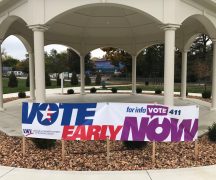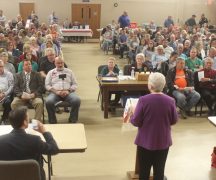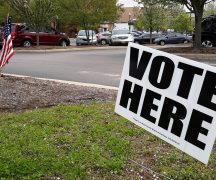By JAN LARSON McLAUGHLIN
BG Independent News
The four candidates for two open seats on the Bowling Green Board of Education explained their stances on masks, inclusivity in schools, and proposed state legislation that would change how history is taught.
The Bowling Green League of Women Voters hosted the candidates forum Sunday evening at BGSU.
The school board candidates began by introducing themselves:
Norm Geer, the current school board president, has spent his life in Bowling Green and graduated from BGHS. He is an attorney, and his wife taught at the middle school for 32 years.
“Teachers perform the most important job in civilization,” he said.
When Geer was considering running for re-election, he was questioned by some about why he would put himself through another term. “This is really important work. I am committed to it,” he said.
The school board’s role is to ensure that each child receives a quality education.
“That’s the star we have to follow,” Geer said.
Ryan Myers, an incumbent on the school board, has spent 22 years working in education. He began as a special education teacher, and for the last 17 years he has worked in administration.
Myers, who has two children in the Bowling Green school system, is accustomed to working with budgets, staffing and curriculum issues. “This is what I do every single day,” he said.
He pointed out his ability to work with people with different perspectives.
“I can collaborate. I can disagree respectfully,” Myers said.
Jessica Swaisgood is employed at a non-profit adoption and foster care agency, and previously worked in residential facilities for people with developmental disabilities.
She was spurred to get involved in school board matters when the district offered only on-line classes during much of the last school year due to COVID. Swaisgood, a parent of two children in the district, created the “BG Voice” organization to advocate for in-person learning.
“I’m clearly not a politician. I’m just a parent,” she said.
“I didn’t mean to start a movement,” she said. But the organization united other parents with shared concerns about online learning. “I had questions and I felt like I wasn’t getting answers.”
“We need change in leadership,” Swaisgood said.
Peggy Thompson retired after 32 years working as an accounts payable clerk for the school district. She has a masters in business administration, and with her husband owns Guaranteed Carpet Cleaning.
“My biggest concern is kids first,” said Thompson, who has grandchildren in the school district.
If elected, she would work for more fiscal transparency, promote more student volunteerism, and work to keep Critical Race Theory out of the schools.
“I want to be part of seeing our Bowling Green students get the best we have to offer,” Thompson said.
The first question posed to the candidates asked them to explain their feelings about masks being required in schools.
Geer said masks are just one of the tools – along with frequent cleaning and spacing – used by the district to keep kids in school.
“This is one we have discussed at length at board meetings with the public,” he said.
According to CDC guidelines, if a masked student is exposed to someone else at school who tests positive for COVID, the masked student does not need to be quarantined.
“Nobody likes the masks,” Geer said. But, “the masks will keep us in school.”
Myers said masks are preferable to students missing school. At one point, more than 200 students were quarantined at Penta Career Center, where Myers works in administration.
“I hate masks,” he said. However, with the current quarantining rules, “it’s about keeping kids in school.”
Myers pointed out the drop in students’ state testing scores after nearly a year of online classes. “There’s a lot of learning loss,” he said.
Swaisgood said her personal feelings about masks are irrelevant. “My most important mission is to keep kids in school,” she said.
If elected to the school board, Swaisgood said she would like to see learning options for students whose parents don’t want them to wear masks.
“I would listen to the community and parents,” she said. “Parents have to have a choice for kids.”
Thompson is opposed to masks being mandated and believes parents should make the decision about their children wearing them. “Masks are very restrictive,” she said.
While science has proven that masks help prevent the spread of COVID, she said there’s “other scientific proof that masks do no good.”
Thompson said she has seen her grandchildren struggle with respiratory problems since wearing masks.
“There is studies that some masks for children are more harmful than good,” she said.
Thompson objected to having to wear a mask during the candidate forum at BGSU, which has a mask mandate. “I don’t see a reason to wear a mask tonight,” since people were separated by more than six feet, she said.
The second question asked the candidates for their opinions on pending Ohio House Bills 322 and 327, which would prohibit the teaching of some American history and current public policy.
Swaisgood said she is opposed to history being censored. “I absolutely would disagree about people not being able to learn about history.”
But as a board member, she would represent the community, not her personal feelings. Swaisgood said she would like the curriculum leaders to meet with the school board on the topic. As a board member, she said she would make sure the district is accountable to the community.
Thompson said she opposes Critical Race Theory being taught in schools. “History is history, but you can always take a slant,” she said.
CRT is about “pigeonholing people, and telling people they are less equal or more equal,” Thompson said. Students should not feel divided by race or economics, she said, adding that they have all been declared equal by the Constitution and God.
“I would like to see us produce productive citizens,” she said. “They need to be educated with the truth.”
Geer, a history major, said Bowling Green City School District follows the state curriculum. The district doesn’t tell students what to think – “our mission is to educate them on how to think,” he said.
“I believe in history,” he said, noting the adage that history is written by the victors. “Those who ignore the lessons of history are destined to repeat them,” he said.
Myers said he is opposed to House Bills 322 and 327. He believes in encouraging free thought – “teaching all sides of history from various perspectives.”
“We’re not trying to indoctrinate anyone,” he said. “We’re trying to have them use critical thought.” When students leave high school, they need to be able to see all perspectives, not just their own, Myers said.
The final question asked the candidates about steps the school board, administration and teachers could take so all students feel accepted in school, regardless of their race, sexual orientation, religion or gender identity.
Myers said school districts should recognize all students and their diverse needs.
“I think we need to make sure we are celebrating students,” he said. “I want all students to feel that camaraderie and be Bobcat proud.”
Swaisgood said the Bowling Green community is far more diverse than the school district. Many of the children of BGSU employees attend private schools.
She would like to ask questions about the school district’s hiring procedures, to see if efforts are made to hire a diverse staff.
“Kids want to have educators and teachers who look like them” and share their views, so they “feel like they belong,” Swaisgood said.
Thompson said inclusivity and diversity efforts put kids into categories. She is opposed to the district’s current vision statement language that promotes “equitable” opportunities for students.
“Equal doesn’t look at differences,” she said. “Our students need to be students,” not categories.
Geer said he recalls when Bowling Green was a “sleepy little college town. Everybody kind of looked alike.” But now the diversity is much greater.
“It has to be addressed” and not just be a slogan, he said. The district should take a systematic look at how it can best make all students feel accepted in school, he said.





